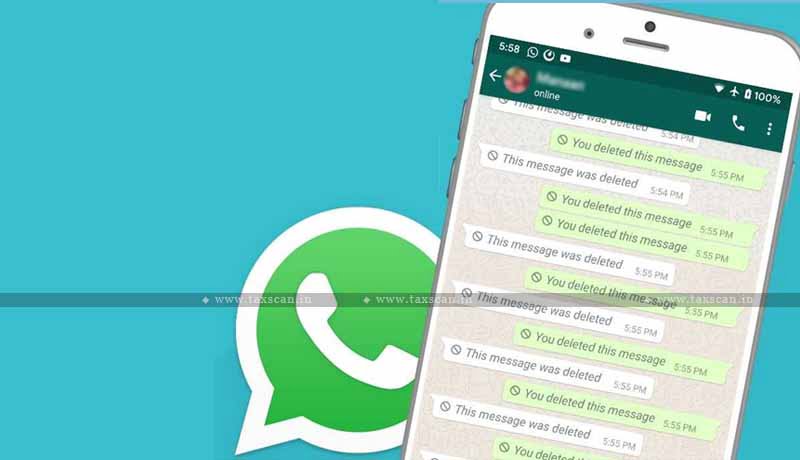
Introduction:
The rapid advancement of technology has led to widespread use of digital platforms such as WhatsApp, Instagram, and Telegram. WhatsApp stands out as one of the most popular communication platforms, especially in business organizations, because of its seamless and secure communication algorithms. With its end-to-end encryption technology which came out in 2016, WhatsApp guarantees that chats between individuals are encrypted and cannot be read by any third party, including the employees at WhatsApp.
This encryption and a promise for complete security have also made WhatsApp chats one of the most trusted written and visual “evidence” by most people, so much so that even the courts were compelled to decide whether such modes of communication can be used as evidence in a legal dispute or not.
The matter of Dell International India Private Limited versus Adeel Feroze (W.P.(C) 4733/2024) is one such judgment where the Delhi High Court was confronted about whether WhatsApp messages will be admissible or not and it was ultimately held that such a message would be inadmissible unless accompanied by a proper certificate as given under S.65B of The Indian Evidence Act, 1872.
Brief Overview of the Dispute
The dispute arose between the parties from a complaint filed by the respondent, alleging that he did not receive the entire copy of the original complaint along with the annexures and substantiated its claim by providing screenshots of the conversations between Petitioner and Respondent.
On the other hand, Petitioner presented WhatsApp conversations as evidence to justify his delay in filing a written statement arguing that he had not received some documents on time but this was rejected by the District Commission because it was submitted beyond the statutory time limit as upheld by the State commission. Aggrieved by the decision of the State Commission, the petitioner then approached the Hon’ble Delhi High Court under articles 226 and 227 of the Constitution of India.
Reasoning of the Court Justice Subramonium Prasad held that the High Court, primarily, was not acting as a Court of Appeal but was only concerned with whether the Tribunal was acting under jurisdiction and that the Tribunal did not violate any principles of natural justice with respect to the impugned judgment.
The court remarked that the WhatsApp conversations could not be accepted as evidence by the court as there was no mention or reference of the WhatsApp conversations in the writ petition, as well as in the order of the State Commission, and as a result, the said WhatsApp conversations could not be read as evidence unless there is a proper certification as mandated by Section 65-B of the Indian Evidence Act 1872.
With regard to the certification, the court clarified that the certificate should enclose that the electronic record was produced by a reliable computer system and that it provides an accurate representation of the information contained in it. The court also held that introducing new evidence before the High Court would underline the judicial process and fairness since it was not a part of earlier proceedings without proper certification and upheld the decision of the District and State Commission and dismissed the petition since the petition failed to justify the procedural delays under the statutory limit.
Recent Court Decisions Where WhatsApp Chats Were Admitted in Evidence
The Hon’ble Supreme Court, in the case of Arjun Panditrao Khotkar v. Kailash Kushanrao Gorantayal and others ((2020) 7 SCC 1), settled the controversy surrounding the electronic evidence and held that the certificate under Section 65B (4) will not be required if the original document itself is produced. The Hon’ble Court held that in cases where it becomes impossible to bring such computer systems into the court, then the only means of providing information will be in accordance with Section 65B(1) along with 65B(4). The certificate must include the following:
- details of the electronic record,
- how the electronic record was produced,
- the device on which the electronic record was produced,
- that the electronic record has not been altered or tampered with, and
- that it was produced on a device that is being regularly used.
The Punjab and Haryana High Court, in the case of Rakesh Kumar Singla versus Union of India (2021) CRM-M No.23220 of 2020, reiterated the case of Arjun Pandit Rao versus Kailash (2020) and held that certification for WhatsApp messages under section 65 B of the Indian Evidence Act 1872 is mandatory and the same can be relied on after due compliance with the Indian evidence act.
The Delhi District Court, in the judgment of M/S. Karuna Abhushan Pvt. Ltd v. Shri Achal Kedia (2020) CS (Comm) No.327/19 also discussed the validity of WhatsApp messages as legal evidence. It held that the messages sent through the WhatsApp messaging app are valid legal evidence. The blue tick over the message proves that the recipient read it. However, the Court reiterated that the provisions contained in Section 65B of IEA should be followed to prove the Whatsapp chats.
Implication and Impact of the Judgement:
The implication of this judgment is essential for several reasons, such as:
- The judgment reinforces the requirement of admissibility of electronic evidence in the courts and highlights the necessity of adhering to the procedural standards and safeguards given under the Indian Evidence Act 1872
- The current decision sets a benchmark for future cases that involve electronic communication, and parties who wish to introduce messages on WhatsApp or other social media platforms will have to ensure compliance with Section 65b or risk the case being dismissed.
- The ruling is also important in the context of consumer disputes as it focuses on the importance of timely and adequately documented submissions. Companies should align and maintain accurate records and certifications as and when needed.
- The case also streamlined the process, thereby reducing the potential for disputes over the admissibility of electronic evidence, which maintains the credibility of the judicial system.
- The ruling also might force the legislation to bring potential reforms for treating digital evidence in India because of increasing disputes in electronic communications.
Conclusion:
The decision of the Delhi High Court has given a much-needed clarity on the admissibility of WhatsApp chats and the necessity of proper certification under Section 65B of the Indian Evidence Act 1872 for admitting WhatsApp messages as evidence, recent judgments by the Supreme Court and other High Courts have provided also discussed the admissibility of electronic evidence, including WhatsApp messages, under certain conditions. It is evident that the legal landscape is evolving to accommodate digital communication as evidence, but it is imperative for individuals and organisations to adhere to the requirements set forth by the courts for the admissibility of such evidence in court proceedings.


This article has been authored by Aamir Ali Sheikh, Associate at Dhruve Liladhar & Co., Advocates, Solicitors & Notary.
